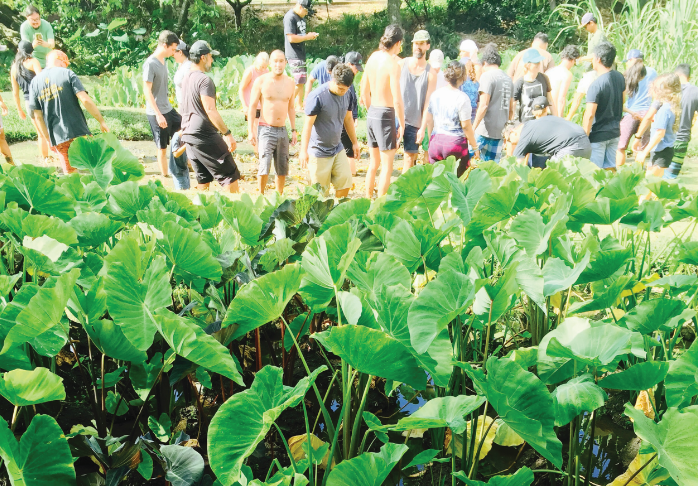Advancing Sustainable Community Food Systems
As an isolated volcanic archipelago in the Central Pacific and host to a population of over 1.4 million, the state of Hawai‘i is heavily dependent on imports of raw materials, manufactured goods, fuel for energy and most importantly—food supplies.
This reliance on imports can easily be disrupted by natural or man-made events, such as storms, climate change, dockworker strikes or even war—making them a credible threat to Hawai‘i’s food security, particularly to the most economically vulnerable in the state.
For the Native Hawaiians and Pacific Islanders living in the historically underserved areas of West O‘ahu, their greatest threat is already a stark reality. Compared to other ethnic groups in Hawai‘i, Native Hawaiians and Pacific Islanders suffer from higher rates of poverty and health disparities, including cardiovascular disease, obesity, hypertension and diabetes. These health problems are compounded by behavioral risk factors for diseases, including higher rates of smoking, alcohol consumption and dietary fat intake, compounded by low levels of fruit and vegetable intake and low levels of physical inactivity.
Born out of pressing community needs, as well as concern over Hawai‘i’s food and agricultural sustainability, the University of Hawai‘i – West O‘ahu (UH West O‘ahu) launched the Bachelor of Applied Science in Sustainable Community Food Systems (BAS-SCFS) in 2015, an innovative community-university collaboration designed to provide a critical, transdisciplinary, and applied education in agri-food studies to the communities of West O‘ahu and beyond. The now established program emerged from a collaboration between the leadership team at MAO Organic Farms, Kamehameha Schools and UH West O‘ahu and draws students from many parts of the continental US and Hawai‘i.
“Because the agri-food system is a complex socio-ecological system, the BAS-SCFS curriculum emphasizes the integration of the natural science, social science and the humanities to develop students who are able to comprehend and address real-world problems,” said Albie Miles, assistant professor of Sustainable Community Food Systems at UH West O‘ahu. “The program places particular emphasis on a critical historical analysis of the impact of colonial and plantation agriculture in reshaping the economy, people and landscapes of Hawai‘i, as well as its parallels in the development of global agriculture.”
At the heart of the BAS-SCFS program is the study of agroecology, a burgeoning academic field that applies ecological knowledge to the design and management of sustainable agro-ecosystems. Agroecology uses a whole-systems approach to studying not only agriculture and farming, but the entire food system. As a multidisciplinary academic field and an international social movement, the aim of agroecology is to advance greater ecological sustainability, resiliency and social justice in the food and agriculture system.
To understand the agri-food system from a transdisciplinary and multi-cultural perspective, BAS-SCFS students are required to:
- take complementary courses in biophysical sciences, social sciences and the humanities each relating to agriculture and the food system
- study the history of agriculture in Hawai‘i from the pre-contact era to the present
- work alongside commercial and traditional farmers as part of a year-long senior practicum course
- spend a full semester working with a local or national NGO learning to advance food system change through education, advocacy and public policy
- map the food system of O‘ahu using GIS and conduct assessments of the food environments in different districts of the island
- learn social science and natural science research methods
- measure food security in the student population
- study the ecological and social costs and benefits of different farming regimens
- read, write and deliberate on environmental ethics and the implications of human values for the future of food and agriculture
“In addition, courses in indigenous natural resources management offer unparalleled opportunities for students to study alongside traditional practitioners and consider how the integration of traditional ecological knowledge and western science may be applied in the pursuit of more ecologically sustainable, socially just and culturally-relevant food and agricultural systems for Hawai‘i and beyond,” added Miles.
From its inception, the BAS-SCFS program was developed in partnership with key native Hawaiian institutions and multiple community stakeholder groups that have been involved in all stages of funding, development and implementation of the program.
Initial funding to support the program was provided by Kamehameha Schools, a large, private educational foundation established to serve students of Hawaiian ancestry. The foundation’s ongoing support has enabled hiring of new instructors in the field of indigenous natural resources management, provided research funding, and enhanced student opportunities for experiential education—including the UH West O‘ahu Student Organic Garden. According to Miles, bi-weekly ‘work parties’ are held in the garden to bring together students, faculty and staff to prepare soil, build compost, plant fruit trees, install irrigation, sow seed, weed and harvest.
MA’O Organic Farms, a 25-acre organic farm and social enterprise, has provided key guidance into the development of the program curriculum, community outreach, fundraising and student recruitment. Under its Kahale Youth Leadership Training Program, qualified West O‘ahu area students are able to receive tuition support to either UH West O‘ahu or Leeward Community College in exchange for working on the MA‘O farm located in Wai‘anae. Critical insight into to the development of the BAS-SCFS course work in indigenous food and farming systems have been provided by the Hawai‘inui‘kea School of Hawaiian Knowledge at the University of Hawai‘i at Mānoa. “With our reliance on importing an estimated 90 percent of food, fertilizer, energy and seed, the Hawaiian Islands are uniquely vulnerable to statewide food insecurity—and food insecurity and diet-related health disparities have long impacted the Native Hawaiian and Pacific Islander communities of Hawai‘i,” said UH West O‘ahu Chancellor Maenette Benham. “These are some of the pressing issues in food security that we continue to explore systematically in our BAS-SCFS program—as we train the next generation of food/agriculture system professionals to think across traditional disciplinary boundaries to solve the problems facing us today.”

